|
|
|
Sort Order |
|
|
|
Items / Page
|
|
|
|
|
|
|
| Srl | Item |
| 1 |
ID:
138691
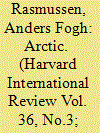

|
|
|
|
|
| Summary/Abstract |
It is unique for its climate and geography: for natural phenomena such as the midnight sun and the Northern Lights, as well as the creatures and the cultures which have evolved there. Throughout human history, it has been viewed with reverence as a special and mysterious place where unique rules apply. However, global warming has begun to reveal the secrets of the Arctic, lifting the shroud of ice, which has veiled the region for millennia, and opening it to ever-greater traffic.
|
|
|
|
|
|
|
|
|
|
|
|
|
|
|
|
| 2 |
ID:
138690
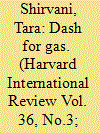

|
|
|
|
|
| Summary/Abstract |
The end of the 19th century, Lord Curzon, then the British Viceroy of India, described Iran and its neighboring Arab countries as “pieces on a chessboard upon which is being played out a game for the domination of the world.” Fast-forward to the 21st century and not much has changed, as the ongoing nuclear negotiations between Iran and the West have started to show implications well beyond the Middle East peacemaking process, even spilling over into the European Union’s strategic decisions on how to consciously uncouple from Russia’s gas supply monopoly. So far, while Iran reached an interim one year deal with the West in early 2013 to freeze all nuclear activities on the condition of being provided with a temporary easing of some sanctions, the pace of progress remains slow. For now, the West is failing to propose an attractive policy that would alter the intransigent stand of the Iranians.
|
|
|
|
|
|
|
|
|
|
|
|
|
|
|
|
| 3 |
ID:
138688
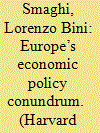

|
|
|
|
|
| Summary/Abstract |
The Eurozone economy is stalling. Growth forecasts have been revised down. Inflation is falling, well below the level consistent with the definition of price stability (two percent). Unemployment remains high. Divergences between the members of the monetary union have not shrank, with northern countries recording large and increasing surpluses in their current accounts, while the deficits in the south have largely been cut through sharp contractions in domestic demand and imports.
|
|
|
|
|
|
|
|
|
|
|
|
|
|
|
|
| 4 |
ID:
138693
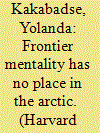

|
|
|
|
|
| Summary/Abstract |
Often we hear about the Arctic as a place buffeted by international and regional pressures — pollutants from agriculture, planetary climate impacts, and rising industrial pressures caused by globalized demand. But the Arctic is also a place of bright hope. It is a place where humankind has a unique opportunity to get development right. Getting it right means instead of viewing the region as a resource frontier to be plundered, we view it as place where sustainability can be more than an afterthought, a place where knowledge-based decisions can safeguard Arctic ecosystems for the benefit of Arctic peoples and humanity as a whole. Our biggest challenge in the Arctic is that we may intervene in Arctic systems on an industrial scale before really understanding the workings and functions of those systems, and so unleash a cascade of impacts that will affect us on a local and global scale. These potential industrial impacts would be added to those already disrupting Arctic systems as a consequence of climate change.
|
|
|
|
|
|
|
|
|
|
|
|
|
|
|
|
| 5 |
ID:
138687
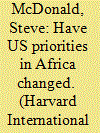

|
|
|
|
|
| Summary/Abstract |
At the end of the first ever US-Africa Leaders Summit on August 7, 2014, President Obama declared that it had been an “extraordinary event,” citing the accomplishments of the summit in terms of trade, investment, and security cooperation. Included in the latter category was a commitment to peacekeeping and the need to address corruption and bad governance in the continent.
|
|
|
|
|
|
|
|
|
|
|
|
|
|
|
|
| 6 |
ID:
138695


|
|
|
|
|
| Summary/Abstract |
The delicate environmental and political balance that composes the Arctic has made it one of the most hotly contested regions in the world. This fragility poses a direct threat to the traditional lifestyles and fundamental human rights of peoples indigenous to the region. While Antarctica is regulated by a strong treaty system, uninhabited and under international jurisdiction, the Arctic is inhabited by four million people, roughly 10 percent of whom identify as indigenous peoples, and its government is balanced among the eight countries with territory in the region—the USA, Canada, Denmark, Norway, Sweden, Finland, Iceland, and Russia. Decisions regarding the Arctic undergo a complicated process involving local governments, central governments, indigenous councils, and the Arctic Council—an international forum of Arctic states and interest groups. With its many levels and stakeholders, the system is far from efficient or effective.
|
|
|
|
|
|
|
|
|
|
|
|
|
|
|
|
| 7 |
ID:
138689
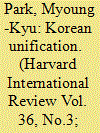

|
|
|
|
|
| Summary/Abstract |
n January 2014, South Korean President Park Geun-hye’s reference to the unification of the two Koreas as a potential “economic bonanza” caused a resurgence of interest in the unification dialogue. Subsequently, in May and June of 2014, President Park brought up the topic of unification as a major agenda item for South Korea, toward which both US President Obama and Chinese President Xi Jingping expressed approval. The North Korean regime, however, evinced a strong negative reaction to these statements, and the official newspaper of the Central Committee of the Worker’s Party of Korea, Rodong Sinmun, made its stance explicit in arguing that the international community’s confrontational maneuvers “injure [the North Korean] ideology and system.” Countries neighboring the Korean peninsula have also tended to accept unification as an elusive vision for the future rather than as an immediate possibility. To what extent, then, are the theories of peaceful unification feasible initiatives, and how can they contribute to peacebuilding in northeast Asia and the international community?
|
|
|
|
|
|
|
|
|
|
|
|
|
|
|
|
| 8 |
ID:
138694


|
|
|
|
|
| Summary/Abstract |
In an age of rising powers, there remain few purely regional affairs. With ascendant powers eager to assert their growing influence overseas, many national issues have become international ones. It seems that the Arctic is no exception. While the Far North was once the domain of a few select Arctic nations, a number of developing nations have gained influence in the region. Namely, China and India have sought to increase their Arctic presence at the same time that Russia is shoring up its own influence there.
|
|
|
|
|
|
|
|
|
|
|
|
|
|
|
|
| 9 |
ID:
138692
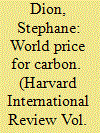

|
|
|
|
|
| Summary/Abstract |
In the following text, I will demonstrate three things. First, that humankind is losing the battle against human-induced climate change, the impacts of which are being particularly felt in the Arctic. Second, that the current negotiations are very unlikely to result in the international climate agreement we need to redress the situation. Third, that the way to redirect these negotiations in the right direction would be to introduce into these international discussions the negotiation of a global, harmonized price for the leading greenhouse gas: carbon dioxide (CO2).
|
|
|
|
|
|
|
|
|
|
|
|
|
|
|
|
|
|
|
|
|